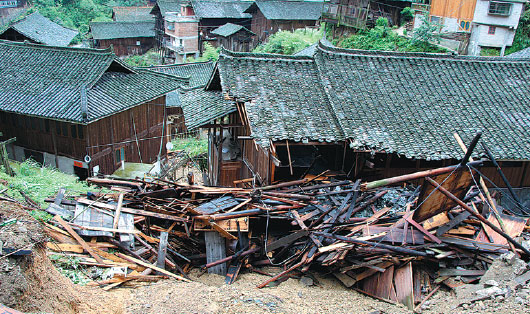Early warnings help flood-hit rural residents
By XuWei (China Daily) Updated: 2015-06-15 07:44
|
A house destroyed by flooding in Leishan county, Guizhou. The county was hit by heavy rain on June 8. Provided to China Daily |
Forecasting difficulties
Hundreds of people lost their lives as a result of flooding on small and medium-sized rivers between 2009 and 2014, according to the State Flood Control and Drought Relief Headquarters.
Unlike large waterways, where it can take several days for a major flood to take shape, forecasting floods and their effects on small rivers is a very difficult process.
Zhou Xinchun, a flood forecaster with the water resources commission, said only one or two hours of continuous rain can result in small rivers breaking their banks without warning. "The whole process is so short that it barely leaves us enough time to make a prediction," he said.
In addition, it's also extremely difficult to accurately predict the exact amount of rainfall an area will receive over a short period of time, which results in different flood scenarios depending on the geography of the affected area, he added.
In response, central government departments, including the Ministry of Water Resources and the Ministry of Finance, have rolled out a number of policy documents and investment plans to support flood-prevention measures on small and medium-sized rivers across the country.
Under an action plan initiated by the ministries in 2013, more than 130 billion yuan ($21 billion) will be invested in flood-prevention projects on small and medium-sized rivers and reservoirs by the end of the year. The ministries estimate that the program will alleviate the flood risks posed by more than 4,006 rivers nationwide.
However, the work is progressing slowly. By September, only 1,289 of the proposed 5,974 programs had been completed, and 48 percent of the programs had yet to be started. Confusion over sources of funding is one of the major stumbling blocks to completion, according to Chen Min, director of the Changjiang Water Resources Commission.
"The financing of projects has proved difficult because local governments have very limited financial capacities, but central government finance isn't applicable for the funding of such projects because they only benefit residents of small areas," Chen said.
Wei, from the Changjiang Water Resources Commission, said more must be done to establish effective early warning systems that will allow villagers time to evacuate their properties, and thereby reduce the number of flood-related casualties.
"It's important to establish an emergency response plan in each village, so warnings can be sent out and villagers know exactly what to do in the event of a flood," he said.
- Govt encourages people to work 4.5 days a week
- Action to be taken as HIV cases among students rise
- Debate grows over reproductive rights
- Country's first bishop ordained in 3 years
- China builds Tibetan Buddhism academy in Chengdu
- Authorities require reporting of HIV infections at schools
- Typhoon Soudelor kills 14 in East China
- Police crack down on overseas gambling site
- Debate over death penalty for child traffickers goes on
- Beijing to tighten mail security for war anniversary








